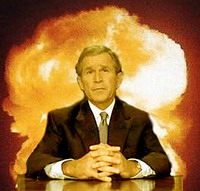Americans express pessimism about work of their leaders in sphere of environment
Americans give their leaders dismal grades for their actions to help environment, according to a poll released Wednesday that highlighted rampant pessimism on the issue.

Only about one in five voiced approval of how President George W. Bush, Congress and U.S. businesses have been handling the environment. And while decisive majorities said they want strong public and private action, fewer than one in 10 said they had seen such steps in the past year, according to the poll by The Associated Press and Stanford University's Woods Institute for the Environment.
The survey, conducted days before Bush was convening an international climate conference at the White House, showed that though Democrats and independents were consistently more critical than Republicans, anxiety is widespread over the environment and global warming.
"I don't understand why we're letting people destroy the Earth the way we are," said Jerry Menees, 34, an independent voter and truck driver. "It scares me what this world is coming to."
Only about a fifth think the environment is in good or excellent shape, including 39 percent of Republicans. Just over one in 10 think it is faring better than a decade ago or will improve a decade from now, while about eight in 10 say global warming is under way - views that were broadly shared across party lines.
The 84 percent who believe world temperatures are rising is virtually unchanged since Stanford and ABC News conducted a similar poll in March 2006. But while 45 percent of that group said in 2006 they were very or extremely sure, 61 percent said so in this month's survey - including most Democrats and independents and a sizable 39 percent of Republicans.
On the other hand, of the 14 percent who said global temperatures are probably not rising, nearly half say they are very or extremely sure - up from the roughly one-third who felt that strongly last year.
"I don't understand how they can say there is global warming or man causes it when it's a natural cycle of the planet," said Russell Marshall, 34, a student and a Republican. "It's like the planet cleanses itself from time to time by changing temperature."
In some of the starkest partisan differences, Democrats and independents strongly disapprove of Bush's performance on the environment, while Republicans approve by 50 percent to 18 percent. Republicans were also likelier to think Bush and business have caused little harm.
Yet even among the Republicans and conservatives, those saying they want Bush, Congress, business or the public to take strong action far outweighed those who said they prefer that little or nothing be done. Nearly six in ten Republicans said there would be serious problems if global warming is not addressed, and more of them said the environment is worse than a decade ago - and will be even worse 10 years from now - than saw improvements.
"I just don't see anything being really aggressively done," said Sonia Alfonso, 50, an interpreter and a longtime Republican who is unhappy with Bush and other leaders.
Even so, this year's poll showed slightly smaller numbers of people favoring strong action on the environment than last year, especially among Republicans.
The poll was conducted before this week's meeting of world leaders at the U.N. designed to spark momentum for international talks in December on further limiting emissions of carbon dioxide and other gases that cause global warming.
Bush, who has opposed mandatory emissions cuts embraced by 175 other countries in the 1997 Kyoto treaty, is holding his own meetings this week with top officials from countries that are major producers of planet-heating gases.
Under Bush, the U.S. has refused to ratify the Kyoto pact. Arguing that binding caps would hurt the U.S. economy, he prefers long-term voluntary goals and clean energy research.
The survey also comes as the Democratic-led Congress moves slowly on the matter.
A House-passed bill would require most utilities to generate at least 15 percent of their electricity from renewable energy sources like the wind, while the Senate has voted to require Detroit to produce more fuel-efficient autos. Lawmakers must approve a compromise before sending it to Bush.
This year has seen growing pressure on the U.S. to act, including a U.N. report concluding that man is almost certainly causing global warming; an Oscar for former Vice President Al Gore's film on rising temperatures, "An Inconvenient Truth"; and a Supreme Court ruling that the government can regulate gases heating the planet.
The survey involved telephone interviews with 1,001 adults from Sept. 21 to 23, and was conducted for the AP and Stanford by Ipsos, the polling company. It had a margin of sampling error of plus or minus 3 percentage points.
Subscribe to Pravda.Ru Telegram channel, Facebook, RSS!




